Newly performed studies have stressed the connection between high levels of air pollution and poor health. For instance, even little exposure to air pollutants could increase the threat of respiratory infections, heart disease and lung cancer.
 Estimation coefficients for the impact of air pollution on labor productivity along API intervals. Image Credit: Dandan Zhang.
Estimation coefficients for the impact of air pollution on labor productivity along API intervals. Image Credit: Dandan Zhang.
Furthermore, the study has demonstrated that air pollution can negatively affect human capital; the attributes esteemed by employers, like punctuality, good communication skills and psychological well-being.
Yet, not much is known regarding the effect of air pollutants on labor productivity. This is due to two main difficulties faced by scientists in their attempts to evaluate the relationship.
The first challenge is scientists require access to hours worked and payroll details over an extended period, which can be hard to get, to ensure the measure is trustworthy. Secondly, it is hard to distinguish between the causal effect of air pollution on productivity and an employee’s wish to work.
For these barriers to be crossed, a team of researchers from China employed a special dataset from a prison factory. Workers in the factory are not offered the choice of self-selecting their jobs and should attend their work every day. They receive “piece-rate” wages associated with the volume of units they finish, instead of the hours they work. Moreover, monthly wage records are well-documented.
The study discovered that, on average, a 10-unit increase in the API or air pollution index (a quantitative measure that explains ambient air quality) results in a 4% decrease in the monthly piece-rate wages of inmates. The study was reported in the KeAi journal China Economic Quarterly International.
This negative impact differs from one demographic group to the other: older and younger workers are more susceptible to air pollution compared to middle-aged workers, and workers who have higher educational levels are more sensitive compared to those with lower educational levels.
Furthermore, there is a considerable non-linear relationship present between air pollution and labor productivity, indicating that productivity drops quickly as the API increases.
Understanding the broader impacts of air pollution on human behaviors is critical for optimal environmental policy design. Our findings emphasize the crucial policy implications for the protection of blue-collar workers from air pollution.
Dandan Zhang, Study Corresponding Author and Professor, China Center for Economic Research, Peking University
Zhang added, “The non-linear relationship we found suggests that even short-term measures to alleviate extreme pollution and reduce its frequency can greatly mitigate the negative impact of air pollutants on labor productivity.”
“For example, in recent years, warning systems have been introduced in Chinese cities such as Beijing, Xi’an and Jinan, which issue alerts when unfavorable air diffusion conditions are likely to trigger extreme air pollution,” continued Zhang.
This allows the authorities to introduce short-term emergency measures, including driving restrictions, shutdown of construction sites, and restrictions on production of heavy industrial enterprises. It has been argued that these emergency measures may be accompanied by high economic costs, but this study suggests that the costs can be compensated, to some extent, by reduced losses in labor productivity.
Dandan Zhang, Study Corresponding Author and Professor, China Center for Economic Research, Peking University
Journal Reference:
Chen, S & Zhang, D (2021) Impact of air pollution on labor productivity: Evidence from prison factory data. China Economic Quarterly International. doi.org/10.1016/j.ceqi.2021.04.004.